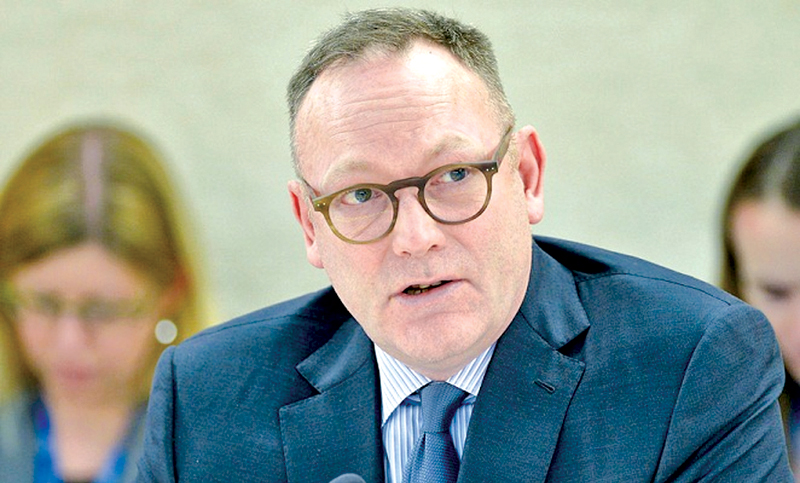There has to come a point where the international community runs out of patience, UN Special Rapporteur on Human Rights and Counter-terrorism, Ben Emmerson said yesterday.
He warned that the government’s progress in achieving the key goals set out in Resolution 30/1 of the UN Human Rights Council (UNHRC) was “not only slow but seems to have ground to a virtual halt”.
Addressing a media briefing held at the UN Compound in Colombo at the end of his four day visit to the island, Emmerson delivered a tough indictment on the government’s role in sticking to its promises made in Geneva, four months into the extension it received from the UNHRC. Emerson during his visit had met Prime Minister, Secretary to the President, Defence Secretary, Foreign Affairs Minister, Law and Order and Southern Development Minister, Prison Reforms Minister, Rehabilitation, Resettlement and Hindu Religious Affairs Minister.
He also met the Commanders of the Tri-Forces, heads of the Police investigation arms, detainees under the Prevention of Terrorism Act (PTA), Minister of Justice, Attorney General, civil society members and the Chair of the Sri Lankan Human Rights Commission.
Emerson however noted that he did not doubt the “the good faith of the Prime Minister or those whose influences who wish to see the delivery of the objectives”.
The Prime Minister, he said had promised that, “once the current process of counter-terrorism reform had been completed, the Government will pass legislation paving way for a Truth and Reconciliation Commission to be established and set up an Office of the Special Prosecutor to bring criminal charges against those involved in the most serious atrocities committed on both sides of the conflict”.
He also noted that Army Commander, Mahesh Senanayake had made a public commitment to ensuring that members of the armed forces who had committed crimes will be brought to justice”.
Despite the assurances however, the Special Rapporteur reproached the government for its slow progress in passing legislation, prosecuting cases of human rights violations and dealing with the cases of detainees charged under the PTA.
According official data provided to him by the Attorney General’s Department, “out of 81 prisoners currently in the judicial phase of their pre-trial detention, 70 had been in detention without trial for over five years and 12 had been in detention without trial for over 10 years”.
He asked that these individuals be “released on bail immediately or bring them to trial within weeks or months and not in years and decades”.
Emerson also explained that the PTA which allowed for “uncorroborated confessions made to police officers as the sole basis for convictions”, had “fostered the endemic and systematic use of torture” within the security apparatus of the country.
In addition, he noted that only 71 police officers had been “proceeded against for torturing suspects since available records began”.
He added that state torture was still very much the norm in the country as a result of the PTA and that detainees had complained of torture as recently as October of last year.
The Attorney General in the meantime had informed Emerson that in the last two years they have been reviewing the cases of all those in PTA detention and “making executive decisions to consent to bail, to divert individuals to rehabilitation programmes or to reduce or drop criminal charges where appropriate” but senior members of the department had stated that they were severely understaffed and resource scarce.
Law and Order and Southern Development Minister in turn had observed that “steps were underway to avoid any new arrests under the PTA and to use the general criminal law wherever possible”.
With regards to the new counter terrorism legislation proposed by the government however, Emerson noted that it too allowed the admission of confessions under police custody at trial and that was a ‘red line’ which did not cross well with international standards. Furthermore the “Government has undertaken to engage in a process of constructive dialogue with my mandate in an effort to improve the draft legislation before it is placed before Parliament. There is still time to get this legislation right and for it to become a new cornerstone of a new order in Sri Lanka”, he said.
“The progress of the legislation to date however has been painfully slow and has in turn delayed the wider transitional justice package, Sri Lanka promised to deliver. This inertia reflects the certain vested interests in the security sector who are resistant to change and above all to accountability and their representatives in Parliament and government”, said Emerson as he stressed that it was up to the people to decide whether they are to “tolerate those who seek to obstruct peace and seek to foster unrest which could break into violence.
With 20 more months to go before the extension given by the UNHRC comes up for review once again, Emerson said it “was very uncertain whether Sri Lanka in its current status can meet the objectives it has set for itself within the timeframe it has committed itself to”.
“All should not pull together to support the government for the benefit of all to deliver its objectives, as these commitments were not set by the international community but by Sri Lanka itself for the benefit of peace for all of its people. Those who wish to characterize this as something the UN is imposing on the country is silly and are lacking in information to be able to understand it”, said the Special Rapporteur.



There are 2 Comments
Govt slow to implement UNHRC resolutions - Special Rapporteur
Sri Lankans are not worried of International community .........
Add new comment